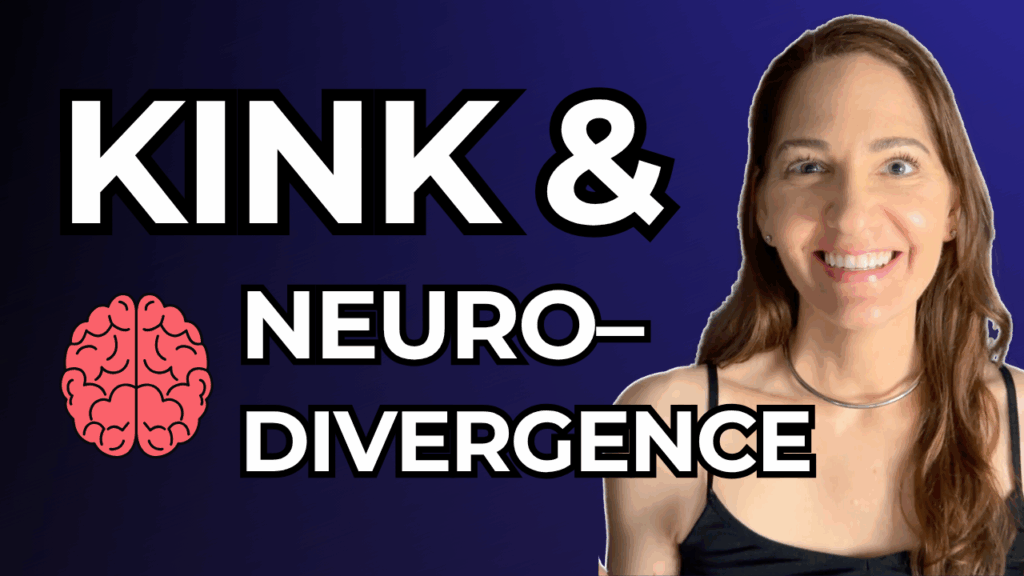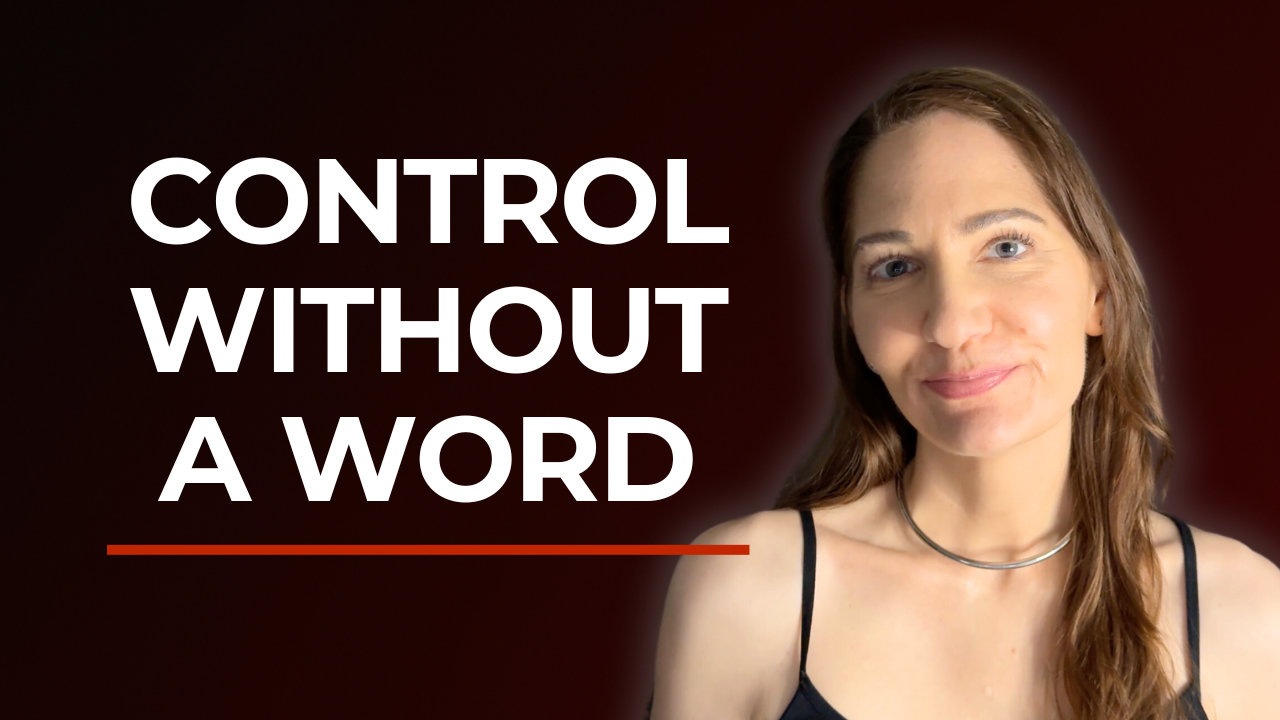
LISTEN TO THE EPISODE:
APPLE PODCASTS | SPOTIFY | IHEART
If you’ve ever felt like the “typical” way people approach BDSM just doesn’t work for you, you’re not alone. As someone who is both kinky and neurodivergent (diagnosed with OCD and likely on the autism spectrum, plus having a partner with ADHD), I’m here to tell you that there is no one right way to do kink.
IN THIS EPISODE
- Why trying to force neurotypical kink dynamics on ADHD or autistic partners leads to exhaustion and burnout.
- The real links between neurodivergence and being drawn to the BDSM community.
- Common challenges neurodivergent kinksters face, including masking, sensory overload, and executive dysfunction.
- Practical tips for customizing BDSM scenes and aftercare for neurodivergent needs.
- How to overcome ableism in kink spaces and create inclusive, empowering dynamics.
Trying to force a neurotypical kink dynamic onto an ADHD or autistic brain is a recipe for disaster. That’s why it’s so important to make your BDSM dynamic customizable for your actual needs.
Let’s dive into how neurodivergence — things like ADHD, autism, OCD, and sensory processing differences — can show up in the kink world, how it can impact your Dom/sub relationship, and how you can build a BDSM dynamic that truly empowers you or your partners.
Why So Many Neurodivergent People Are Drawn To Kink
Did you know that neurodivergent folks are everywhere in the kink community? There actually seems to be a much higher percentage of people with ADHD, autism, and related conditions in BDSM spaces compared to the general population. Why is that?
Here are a few key reasons:
1. Kink Offers Structure in a Chaotic World
Daily life — the “vanilla world” — can feel unscripted and unpredictable. Rules and expectations aren’t always clear, and for neurodivergent brains, this can be exhausting. In contrast, BDSM offers clearly defined roles, contracts, rituals, and protocols. Everything from collaring ceremonies to task lists gives you a sense of order and predictability. For many, this is a relief, not a restriction.
2. Kink Gives You Sensory Control
Some people with autism or ADHD crave more (or less) sensory input. With kink, you get to say exactly what sensations you want or don’t want, and you can stop things any time with a safeword. For me, being able to choose when and how I’m touched or what music is played has helped me actually enjoy scenes, instead of feeling overwhelmed.
3. Clear Roles Make Social Interaction Easier
Having to constantly guess “what’s appropriate?” or “how should I act?” is draining. But in kink, the expectations are often spelled out and negotiated up front. For submissives, knowing what service or rules are expected removes the anxiety of reading social cues. For Dominants, having a script and a set of rituals to guide scenes can be incredibly grounding, especially for those with ADHD.

The Challenges Neurodivergent People Face In Kink
With all those benefits, why is it still hard sometimes? The big reason: most kink education, “ideal” power dynamics, and protocol expectations are still designed for neurotypical people. If you’re neurodivergent, you’ve probably run up against some (or all) of the following:
- Masking: Pretending you aren’t overstimulated or anxious during a scene, just to keep up appearances. I’ve been there myself, and it only ends in burnout.
- Sensory Overload: Loud music, strobes, or heavy smells at a dungeon can trigger a shutdown or meltdown. After a particularly intense scene in a crowded space, I can sometimes spend days recovering.
- Executive Dysfunction: Sometimes your brain just can’t initiate or complete tasks, even though you want to. Doms with ADHD (like mine) can feel paralyzed by having too many options and responsibilities.
- Miscommunication: Differences in processing speed or communication style can lead to confusion and hurt feelings. My Dom and I are constantly working on being clear about our needs, especially because our brains work a bit differently.
- Burnout: Neurodivergent folks are more prone to scene drop or post-event exhaustion. For us, it’s not just emotional — it can feel neurological.
Ableism In Kink Spaces: The Pressure To Perform
One of the hardest things isn’t the kink itself, but how others in the scene sometimes treat neurodivergent people. There’s an unspoken pressure to keep up with high protocol, high energy events, or to “just fit in.” Some folks, and even some play spaces, dismiss you as too “complicated” or treat your needs as an inconvenience.
I’ve even heard people say, “If you need that many accommodations, maybe you’re not cut out for this lifestyle.” Let me be clear: that attitude is garbage. Neurodivergence isn’t a failure — it’s just a different operating system. Kink should be the most customizable, inclusive space out there.
Practical Hacks For Customizing Your Neurodivergent BDSM Dynamic
Now for what actually works! Here are some ways I, my Dom, and my clients have adjusted our BDSM power exchange to meet neurodivergent needs. Feel free to borrow or adapt these hacks for yourself or your partner:
1. Write Everything Down

Use written negotiation checklists, scene planning boards, or even journals to lay out roles, rules, tasks, and protocols. It takes pressure off memory and reduces the risk of misunderstandings. Visual learners can draw their ideal scene space or use calendar stickers for rituals.
2. Use Visual or Tactile Safeword Systems
If verbalizing is hard when overwhelmed, create alternative safeword options. One of my students made a bracelet with colored beads: red for stop, yellow for slow down. During a scene, just pointing to a bead speaks volumes.
3. Build Low-Sensory Scenes
Customize scenes to reduce overwhelm: softer impact, gentler music, lower lighting. Create aftercare plans with weighted blankets, soft snacks, or even a “no talking” period after scenes. My Dom and I have a silent cuddling ritual to help us both re-enter our bodies after an intense scene.
4. Use Hand Signals, Emojis, or Number Codes
When communicating, especially online or in public, non-verbal methods can be a lifesaver. One couple I know uses a 1–5 hand signal system to quickly check in during scenes.
5. Pre-Plan Aftercare
Anticipate sensory needs and plan aftercare rituals in advance. One client made laminated cards listing specific aftercare needs to hand over if verbal communication was impossible after play.
Mindset Shifts: Your Needs Are Valid In Kink
Customizing your scenes and rituals isn’t “cheating” — it’s smart. Needing routine or sensory control doesn’t make you less dominant or less submissive. If anything, it just means you’re learning to thrive. Slow processing isn’t a flaw. It’s just a need for more processing time or a different communication style.
As I’ve told my own child (who has ADHD), your brain is your superpower. The world isn’t going to adjust for you, but your BDSM dynamic absolutely can and should.
Neurodivergent and Kinky? You Belong Here
You don’t have to “fix” your brain before deserving a fulfilling kink life. Whether you’re autistic, have ADHD, or are just wired differently, your needs aren’t too much. The dynamic you build together can be adjusted to honor you and your partner’s neurodivergence.
Want more support? Grab my free BDSM resource library below for checklists, templates, and scene ideas for neurodivergent minds:

Links From the Episode:
Want more? Sign up for my newsletter and get BDSM tips on the regular.


